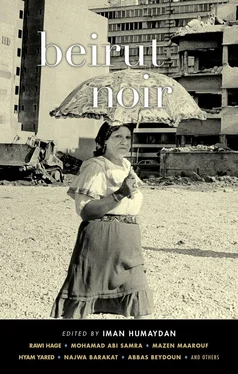As for the supposedly legitimate son, you could have attributed his small stature to the fact that he was completely flattened by his father’s tyranny. Though his father was uneducated, the boy was destined to become a doctor — a great doctor. And according to a magnanimous decree, he was always meant not just to be near the top of his class, but among the top five. Fear and determination offset his mediocre intelligence and he almost always succeeded at keeping himself in the third or fourth position, even at the cost of the most beastly indignities.
Though he was rich, the father resided in the bustling neighborhood of Chiyah, on Assaad al-Assaad Street, where he owned a building and lived in an apartment on its top floor. Adjacent to the building, a low, little house of two excessively narrow rooms — built in a rush a few months before he was born — served as the lodgings for the bastard and his mother. The bastard never entered his half-brother’s bedroom. In fact, the whole apartment was off-limits to him, their father being unable to stand anything that might unite the two children. It was the same for the legitimate son: crossing the low, little house’s threshold was absolutely forbidden. The possibility of any exchange between this child and his other potential mother — the maid who had been his mistress — terrified the father. Nonetheless, even the laws of the universe were unable to stop them from killing time together. And they often played together in the mud behind the low, little house.
There was a small sandy enclosure just behind the bastard’s house where they met daily — at dawn during vacations, in the afternoon on school days. The father often sent the building’s doorman to bring the legitimate son home, dragging him by the ear.
Usually, they filled buckets with water that they mixed with earth to make mud projectiles to throw at each other. You would have said that each one was relieved of his shame by splattering his half-brother’s face with mud. In fact, each aspired to the other’s misfortune: the scorned one coveted respect; the slave, his freedom. One evening, when they were twelve years old and amusing themselves by smearing mud beside their house, the so-called bastard said proudly to the supposedly legitimate son, “You don’t have to worry about anything, your life is so easy! Your future is secure, you have money and a father.”
Wounded, his brother didn’t know how to respond at first and started to cry. Finally, he stammered through his tears, “But at least you’re allowed to play when you want. And you also have a mother.”
The bastard enjoyed an unprecedented popularity at his school... their school. His ugliness — unlike his brother’s — didn’t at all prevent him from being popular among the female students: whenever he’d appear, it was as though their clitorises transformed into claws and tore viciously into their flesh. By the time he graduated with his baccalaureate he’d already deflowered a dozen — the other was still even less than a virgin.
The one, according to plan, enrolled in medical school. The other, leaving the low, little house a few months before his mother’s death, was hired as a waiter and began studying law. They didn’t see each other for three years.
The Communist epidemic was palpable in the air; from one day to the next, it intoxicated a significant number of student brains.
Every evening, the local bar transformed into a forum for heated political debates. One particular Friday, the controversies grew so ferocious that people came to blows with fists, glasses, bottles, and chairs. After the owner was finally able to evict this thunderous crowd, drunk on alcohol and ideas, two young men recognized one another outside in the dark. They each walked alone, on opposite sides of the wide street, their footsteps drawing parallel paths. It was dark, but a few weak moonbeams surreptitiously pierced through the heavy cloud, and then two giant, thin, infinitely stretched-out shadows were drawn at a diagonal behind each of their backs. They pretended not to notice each other but from time to time shot over quick, furtive glances.
This farce had already lasted a good while when the bastard had an idea that made him stop cold. So he crossed the street. Seeing him approach, the other one, paralyzed, nervously chewed on his lower lip and stared: unspeakable hopes were aroused in his heart that left him nonetheless vaguely sensing a tragic outcome. When they were face to face, the bastard — putting on a somewhat ironic grimace — exclaimed with affected surprise: “But someone might say that this is my brother!”
“Or rather your half-brother,” the other one immediately corrected him. Still, he found it impossible to pull himself away physically, but believed instead that the extreme precision of his comment could at least establish a certain distance in their kinship.
“Whatever,” said the bastard, calm and condescending, instinctively seizing upon the futility of his brother’s gesture. Using his old favorite childhood way of teasing, which despite its terseness reminded the other one of the full extent of his subjugation, he said, “So then, doctor , sir, how are you today?” After a moment of mutual discomfort, he sharply added, “Let’s walk a little,” to put an end to the brief silence.
The sun had already risen and the two brothers were still walking. They had spoken feverishly all night long. After they separated, each one, desperately trying to fall asleep in his own bed, tried in vain to repress some bits of this long nocturnal conversation.
In his head, the legitimate son mostly replayed their discussion about communism, which fascinated him to no end. The subject had somewhat concerned him during this past year, but until now he had been content to simply pay it modest attention without getting carried away by the general frenzy which had gradually gained ground inside the universities. Yet just a few hours had been enough for his brother’s eloquence to, quite simply, ignite him. He was taken by a boundless admiration for the People, and henceforth considered himself a devoted supporter of the cause. For the first time in his life, this freedom that he so coveted but rarely knew became incarnate; it took form, nearly flesh and bone. He was possessed by unprecedented pleasure, but soon he found himself tumbling into a terror that grabbed him by the neck and strangled him.
Ideas from the same conversation, but utterly different in content, scuttled through the bastard’s mind while he lay in bed, staring at the ceiling. The enthusiasm he knew so well how to inject into his brother had clearly shown him the true extent of his capabilities. In truth, possessing a superior mind as well as a highly independent and excessively reckless character, he never once missed out on exercising a certain influence over this submissive being. Meanwhile, his brother could offer no resistance to the absolute domination that the bastard knew he was now capable of: he would steal this son away from his father. Moving back into his old house was the first thing that he intended to do.
The father had sold his building on Assaad al-Assaad Street two years before, and the new owner, with the intention of building a much bigger structure there, planned to demolish it at the same time as the low, little house that had once served as lodgings for the so-called bastard. But the outbreak of the civil war had caused him to postpone his project.
It was the very inevitability of its destruction that compelled the bastard to rent his old house three years after having left it, when his mother died and he started at university. He wanted to recall bits of his past, but didn’t really know which ones.
Читать дальше












